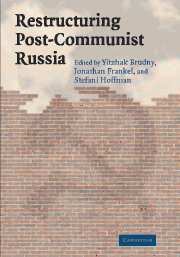What comes after socialism?
Published online by Cambridge University Press: 25 July 2009
Summary
The essays in this volume originate from papers presented at a conference at the Hebrew University of Jerusalem in May 2001 to honor the career of Theodore H. Friedgut, a scholar whose research on the Soviet system was characterized by a scrupulous attention to detail and a willingness to treat Soviet citizens as real people with interests and views of their own, still capable of making choices and exerting some human influence within the rigid and oppressive political system that entrapped them. A concern with the human impact of politics and a willingness to look beyond the facade to study the ways in which politics really works are excellent principles with which to investigate the regimes that have sprung up in the wake of the Soviet collapse.
The end of state socialism in the Soviet Union and Eastern Europe was a defining moment of the twentieth century. The experience was strikingly different in the various component regions of the Soviet bloc, however. In Central and Eastern Europe the experience was, for the most part, one of liberation. People were swept up by a surge of optimism and a sense that the future would be better than the past – and better than the present. In the former Yugoslavia, the situation degenerated into violence and slaughter on a scale that few could have imagined. In the countries that emerged from the former Soviet Union, the political breakdown produced a socioeconomic collapse with few parallels in modern history.
- Type
- Chapter
- Information
- Restructuring Post-Communist Russia , pp. 3 - 18Publisher: Cambridge University PressPrint publication year: 2004
- 1
- Cited by

